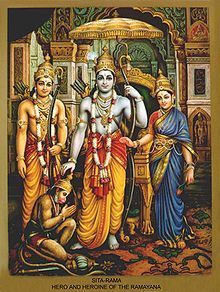Rama, Krishna and Kalki: some thoughts on the Ramayana
Rama has always been a controversial figure. People either adore him or deplore his treatment of Sita. Feminists through the ages have subtly subverted the epic, including through songs centred around the experiences of Sita and her champion, Shanta (Rama's sister). Even his staunchest devotees have reservations about some of his actions, like the killing of Vali. This is my take on Rama.

Scholars have pointed out that the evolution of the Vishnu avataras from matsya (fish) through Narasimha (man-lion) to Rama and Krishna (human) closely parallels the Darwinian course of evolution. Rama is generally held to be the embodiment of dharma, or duty, and Krishna the embodiment of love. In Krishna we see every form of love from mother love to romantic love to loving friendship to bhakti.
If Krishna is one step up from Rama, it follows that love is a step up from duty. But just as an amoeba cannot turn into a human without passing through every stage of evolution, one cannot get to love without passing through dharma. So if Rama appears to sternly adhere to dharma without regard to the feelings of his beloved wife, it is because he must. Even though he hurts himself too in the process, the priority of dharma cannot be overridden. He is a necessary step in the evolution of humankind. A possible English equivalent to Rama's attitude is Richard Lovelace's famous line, "I could not love thee, dear, so much, loved I not honour more." Perhaps this is the principle underlying all chivalry.
I'm not really sure I subscribe to the avatara story. What I think is likely is that Rama and Krishna were real historical figures who were deified in the usual way that ancient peoples deified their kings; and that they had some really special qualities that made them more godlike than other kings. The avatara story is possibly a grand- or meta-metaphor to describe the evolution of life on earth.
This makes me wonder: what is the overriding quality of Kalki, the avatara-to-come? Is it something we know but don't give importance to? Or something new that we've never dreamt of? Like the myriad colours that a bee may see but we can't?

Scholars have pointed out that the evolution of the Vishnu avataras from matsya (fish) through Narasimha (man-lion) to Rama and Krishna (human) closely parallels the Darwinian course of evolution. Rama is generally held to be the embodiment of dharma, or duty, and Krishna the embodiment of love. In Krishna we see every form of love from mother love to romantic love to loving friendship to bhakti.
If Krishna is one step up from Rama, it follows that love is a step up from duty. But just as an amoeba cannot turn into a human without passing through every stage of evolution, one cannot get to love without passing through dharma. So if Rama appears to sternly adhere to dharma without regard to the feelings of his beloved wife, it is because he must. Even though he hurts himself too in the process, the priority of dharma cannot be overridden. He is a necessary step in the evolution of humankind. A possible English equivalent to Rama's attitude is Richard Lovelace's famous line, "I could not love thee, dear, so much, loved I not honour more." Perhaps this is the principle underlying all chivalry.
I'm not really sure I subscribe to the avatara story. What I think is likely is that Rama and Krishna were real historical figures who were deified in the usual way that ancient peoples deified their kings; and that they had some really special qualities that made them more godlike than other kings. The avatara story is possibly a grand- or meta-metaphor to describe the evolution of life on earth.
This makes me wonder: what is the overriding quality of Kalki, the avatara-to-come? Is it something we know but don't give importance to? Or something new that we've never dreamt of? Like the myriad colours that a bee may see but we can't?
Published on August 13, 2013 22:55
No comments have been added yet.
Read, Write and Left
Blog of a somewhat indiscriminate reader and gauche (in the French sense of course) writer.
- Harini Gopalswami Srinivasan's profile
- 71 followers



